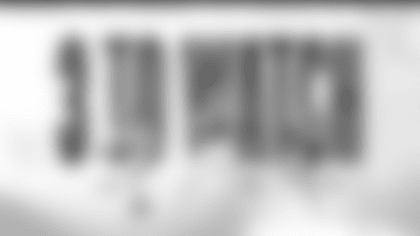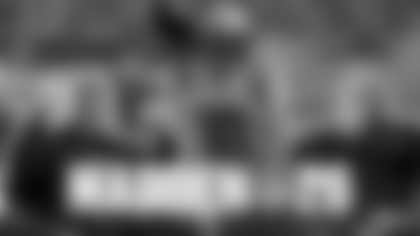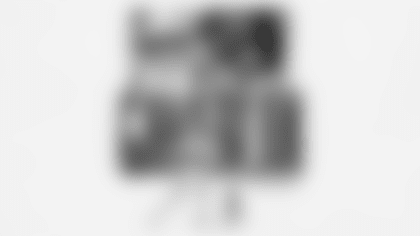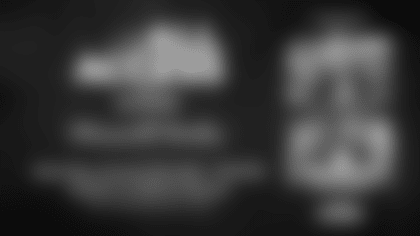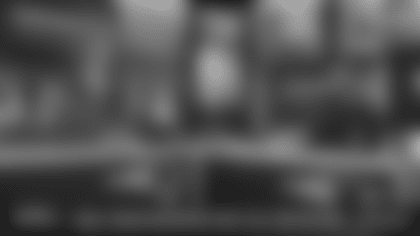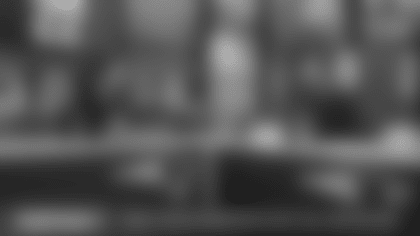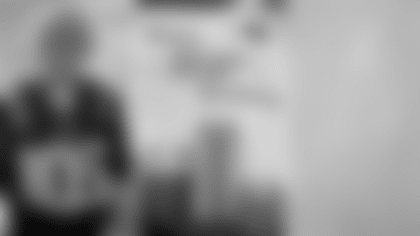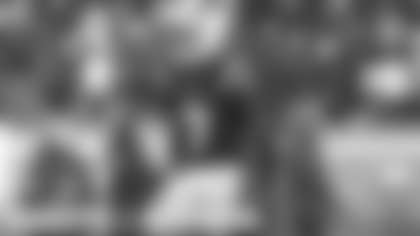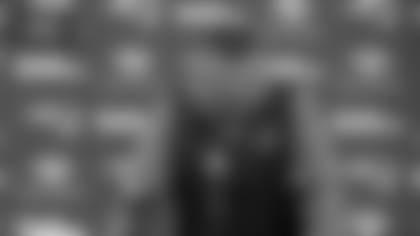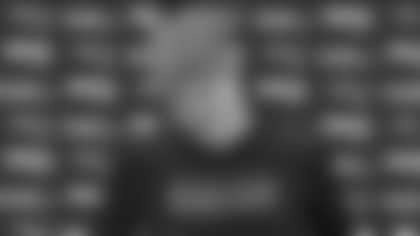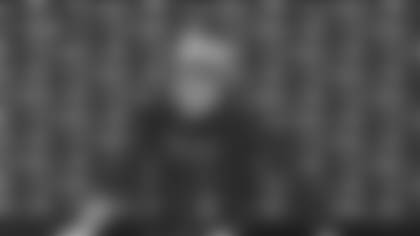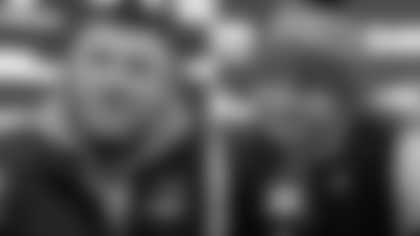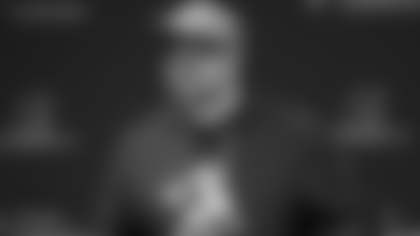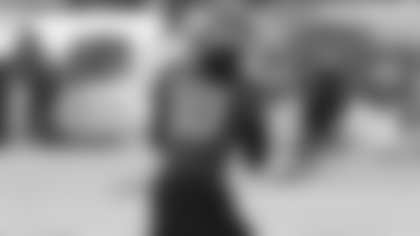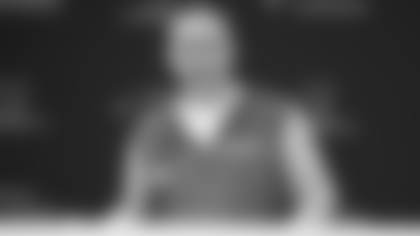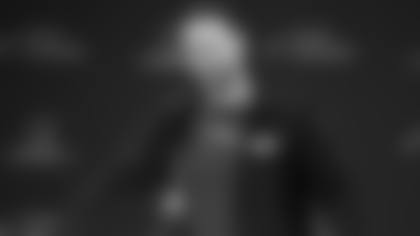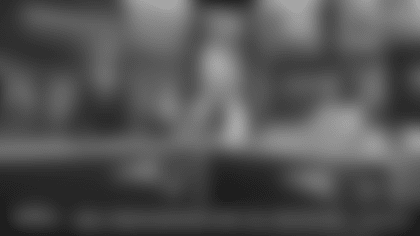Q:You said that you'd be looking at execution on third-and-short both offensively and defensively. Is that an execution or schematic type of thing?
BB:Yeah, we have to look at everything. I'm sure that, I think we have to do a better job of coaching whatever it is we're doing; whether it's the plays or the techniques or whatever. We just have to get everybody on the same page. Obviously, you don't need a lot of yardage there, but you need to be able to do it right and a little bit of penetration or a little bit of being late off the ball or not quite hitting the hole at the right angle or quick enough or whatever and you're stopped. We just have to look at the whole thing and try to – I mean, we have to be able to convert better in that situation.
Q:From your experience, what has produced the most successful bye week for you in terms of balancing the first part of the season and cleaning stuff up and looking ahead to the rest of the season and also allowing players and coaches to get away a little bit?
BB:I don't know. I think it's just a question of trying to utilize our time productively and get the most out of it. Part of it is rest, part of it is being able to get a little bit re-energized and just give our minds to not deal with a game plan, not deal with a scouting report, not deal with adjustments, not get ready for a final exam. At the same time, we need to try to look at some things that we can improve on and do better. I think our team has made some improvements over the first nine games of the season and we need to keep doing that. So, hopefully we can kind of strike that balance of improving in some areas and trying to maintain the consistency in some of the things that we've been fairly productive at.
Q:What do you think has contributed to Patrick Chung's ability to come in and play at a level that seems to be a little bit higher than what we saw when he was last here? I don't know if you'd agree with that.
BB:I thought he played pretty well for us in the time that he was here. I think kind of the circumstances of the '12 season just didn't work out as well as probably we all hoped they would for a combination of reasons. Pat and I talked about that last year after he was released from Philadelphia. Pat and I talked about that. We had a long conversation about a lot of things. Not saying it was anybody's fault, it was just one of those things that didn't work out. But we both felt that we'd want to try to give it another shot. We were able to come to an agreement on that, contractually. I think he's done a real good job for us. He's filled a lot of different roles. He's played well. He's helped us in the kicking game; he's helped us defensively in a number of areas. He's been active, been around the ball, been productive and he's got experience. Even though he's a new player, he was here for four years so it's not – in a way, he really has a lot of experience in our system. I think it's worked out, worked out really well, at least on my end of it. I feel great about having him on the team and what he's done for us.
Q:I read that Denver had brought a left-footed punter into camp and worked him out. I'm curious about the history of left-footed punters, with you in particular. Is there an advantage to it? It seems like it's become more commonplace in the league recently, but what is the thought process behind that. Is there a difference over the course of the season in having a left-footed punter?
BB:That's a good question. There's definitely something – a left-footed punter, right-footed punter, the ball spins opposite and what you get used to when you go to the other foot it's reversed. I think there's definitely something to be said for that, practicing that way. I know going back to when we were at the Giants and I was the special teams coach there, we had a right-footed punter obviously with [Dave] Jennings and then with [Sean] Landeta and when we would face a left-footed punter, we always kind of just wanted to get the returner to handle those balls, which was [Phil] McConkey. It was several different guys, but I definitely remember McConkey and how Phil would talk about how that would, even though he'd done it before, it was just good to get familiar with it prior to doing it in the upcoming game. [Phil] Simms would punt to him. Even though Phil [Simms] does a lot of things right-handed, he punts left-footed, believe it or not, and actually punts pretty well. So, we would do that. I had a lot of right-footed punters. I had Jennings, I had Tom Tupa in Cleveland, [Brian] Hansen and then when I came here, we had a left-footed punter with [Lee] Johnson and then it just was [Ken] Walter and [Josh] Miller and it's just kind of evolved that way. Now we had [Todd] Sauerbrun for a while, half a season or a third of a season, whatever it was, but for the most part it's been left-footed punters since I've been here in New England. That's not really by design. I'd say it's just more kind of worked out that way. But it is kind of a long coincidence of that. But it was probably just as much a coincidence that it was the other way. I don't think it really makes any difference in terms of the punting because there's nobody else involved. The snapper and then the punter, it's not like you have a left-footed kicker where you have to flip your holder and the operation is a little bit backwards. With the punter, it's just the way he does it and it doesn't really affect anybody else. But I think there is something to the returner getting familiar with those balls. I don't want to make a big deal out of it because I don't think it's that big of a deal, but I do think that there's no question it's the reverse spin and the reverse reading of the ball.
Q:How much of this extra time that you have here will be spent looking ahead and preparing a little bit for some of these teams that maybe you're not as familiar with, those NFC North teams that are coming up on the schedule? Or is it primarily just looking at the Colts?
BB:So we have, on our staff, we have certain people on our staff that it's kind of their job to get ahead. If we're playing Game 1, then there are certain coaches that are working on Games 2 and 3 and so forth and bump it right on down the line. So, once we're finished with Game 1 and we turn to Game 2, I would say the majority of the staff and even maybe a couple coaches that might look a little bit ahead, they've probably put 90 to 95 percent of their time in on the team that we're actually playing. But there is still a process of organizationally working ahead so that when the coaches go in and the other coaches go and turn their attention to the next opponent that the information is there. It's already identified, sorted out and there's a presentation of it that cuts and identifies a lot of the details so you don't have to wade through it and everybody try to figure it out themselves. I don't think that's really going to change too much, to be honest with you. I think this week is about looking at some of the things that we need to do. It's looking at the Colts, but then again, there are people on the staff and in the organization that are beyond that in terms of preparing us for those teams when we get to them. It's really always that way, so we'll continue to probably stay with that same pattern, if that makes any sense.
Q:I have a historical question for you and while you were in grade school during this period, I'm hoping that you have some insight based on your study of the game. What was it like for Gino Cappelletti kicking field goals back in the '60s?
BB:Well, yeah, I mean I was – thanking you for not dating me back quite that far. When I first came into the league in 1975, I think we talked about this before, I would say most teams had a kicker. Some teams had a punter, other teams had a guy that played a position and also punted. Then most every team had a position player who was the long snapper, either an offensive lineman or a linebacker or tight end or somebody like that. There were very, just pure long snappers like every team has now. There were, as I said, some punters, probably there were more punters than there were positon players punting, but there was an element of both. I would say the kickers had almost all transitioned at that point. I think one of the big things with kicking, unlike punting, is timing. You have the snapper and the holder and the operation and when the kicker starts a little bit early then that fouls up the timing. If the kicker starts a little bit late then it doesn't foul up the timing, it just puts you more at risk to have the kick blocked. So, one of the things the kicker deals with is just the timing and some of that is the anticipation. So the more the kicker knows the snapper, the more he can kind of anticipate that mannerism or length of time, anticipation of when the snap is going to occur and then start into his approach to the ball and kick. Obviously, the better that operation is and the more experience those guys have together, to include the holder, then theoretically the better it will be, the smoother it will be. With a punter, again, there's less of that. I mean, there's some, but there's certainly less of that because that other guy is not involved. Again, a long answer to a short question, but part of the issue in the kicking game in those days was time. So, if you were a kicker, you weren't able to kick until – even if that's all you did, if you were just a pure kicker – you wouldn't be able to kick until the center was available to snap. So the centers would usually come out maybe five, 10 minutes early and maybe snap for the punter and the punters would punt to the punt returners, which again, your punt returners were usually position players, too. Then let's call it after practice, then that same snapper would snap to the holder and the kicker and that was their practice, those whatever it was, five, 10 minutes at the end of practice and the same thing with the returners. Now you have situations where during the whole practice, as you've seen out there on the field, the snapper, the holder and the kicker or the snapper and the punter work together for extended periods of time. It's not just five minutes at the end of practice after everything else has been done. So the opportunity to be precise and efficient and the execution level on that, obviously, drastically improves. I'd say then where you see the biggest change – so, was it challenging for those kickers? Sure it was. Because a, the field conditions were a lot less than what they are now where it's either great, most fields are pretty good grass or it is turf, which is very consistent. Back in those days, the fields would vary from one end to the other, depending on if you were kicking sometimes on the infield end that was sodded or not sodded, depending on what time of year it was versus the outfield end in the baseball stadiums, which is what most of them were. The conditions weren't as good, the timing wasn't as good, the opportunity to work with those players, with each other wasn't as good. Then I would say that the biggest difference would be in the punting game when I would say until the mid-'80s, most all teams used at least one end tight, if not both ends tight in punt formation unless they could see that the team was in an obvious return mode and there wasn't a threat to rush, then they would split out both guys. But a lot of times you'd see guys split out and then if the return team threatened, then they'd pull them and they were tight punt formations. So in the mid-'80s, really the whole punting game kind of got revolutionized and changed dramatically with Steve DeOssie in Dallas. When Steve went to Dallas, he was able to snap and block and Dallas went exclusively to a spread punt formation and teams like us – the Giants – because they were in our division, we always felt like…I mean, normally the snapper's responsibility on the punt formation back in those days was just snap the ball. They didn't have any blocking responsibility ever. Then that all changed when DeOssie went to Dallas and he started doing it and so you'd see what you see now, which is two spread guys, eight guys rush, the center will block one of them and the other seven guys block the other seven and they punted the ball. Once we all saw that, that it was doable and Steve was doing it, then you started looking for, 'OK, can we get a guy to do that?' that enabled you to split the ends out. That's not a kicking conversation, but it's all kind of related there. Then that got to the evolution of how important the snapper was and I would say that teams at that point saw the value of keeping a pure snapper that was able to not only snap the ball consistently, but also snap and block because of the advantages it gave you in the punting game. I would say within probably five years or so, by the early '90s, you rarely saw a team in a tight punt formation, unless it was the end of the game or backed up or a situational type of punt. Almost everybody went to spread punt formations. That was really the result of the snapping situation, in my opinion.
Q:What are some of the measures you use to try to determine how effective your special teams are? I'm guessing yards gained or saved in the punting game and things like that. Are those measures you guys keep?
BB:Yeah, sure. I think that absolutely really comes under the whole category of hidden yardage, if you will. For example, fielding a punt and fair catching a punt that's say 37 yards versus not catching it and it rolls another 13 yards and now it's a 50-yard net or a 13-yard change of field position. So those 13 yards don't show up in the stats. It's not a sack, it's just if you had handled the ball, you would have had it at midfield, but you didn't handle it so you have it at your 37. Those plays are definitely hidden yardage in the kicking game. Things like penalties, they're generally at the spot of where the ball was caught most of the time, in the punting game. So if you return a punt for 10 yards and get a penalty, it's really a 20-yard loss of field position as opposed to a 10-yard penalty. So the penalties in the kicking game, generally speaking, result in more yardage than they do on normal scrimmage plays.
Q:Like the other night.
BB:Yes, right. That was a good example right there. When Don Jones got the block in the back call, so they lost the return yardage and they had the penalty on top of it, so it wound up being 20 percent of the field or 25 percent of the field. So it was a huge field position play penalty. We track all those. We try to, obviously, stress the importance to the players of those decisions and those situations because of what's at stake there from a field position standpoint. I mean another huge stat in the kicking game is missed field goals. I mean really missed field goals are almost the equivalent to a turnover. Not only do you get the ball, but you get it plus seven yards. There's a real cost to a missed field in terms of field position, particularly on a longer one, obviously. But if you miss it from the 15, it's not that much different than if you had punted. But you know what I mean. If you miss a long field goal, that's really like a turnover. There's a lot of hidden yardage there. There's a lot of different ways to calculate it and measure it and all that. The bottom line is as a coach, what you want your team to do is make the most out of each situation. Like, we saw a play in our game where we mishandled a kickoff in the end zone, but the ball didn't come out of the end zone so we downed it. We saw a play the other night, similar play, where the ball did roll out of the end zone. Things like that, which again, it's not really a stat play, it is but it isn't, but it's certainly a big field position play. Like I said, the goal for us as a coaching staff is to try to get the most out of those plays, whatever it is. Do we measure it? I mean, yeah, we do. But the most important thing is to try to make sure we do it right and get the most out of it. When we don't, we need to make sure players understand and we all understand how important those plays are.
Q:Did you have any connections with Brendan Daly before bringing him in this year? How has he fit in with the players and staff?
BB:Yeah, I mean I have had some connections with Brendan. Of course Brendan has coached with other members of our coaching staff at other places. So the people that Brendan has worked with I've worked with and have known through the years and so forth. I mean, I haven't obviously worked with him. I haven't had a personal relationship with him until this year. But I'd say we've both kind of known about each other through mutual friends and associates and that kind of thing. I think he's done a great job for us. He obviously has a lot of experience. It's experience in different organizations, which I think can be a strength because it just brings a different perspective. I think his fundamental teaching background on the defensive line is outstanding. I think he really has a great understanding of technique, hand placement and fundamental teaching. I would say the way he does it is exactly the way I learned it and we taught it at the Giants. It may not be the exact same terminology, but it's the same technique, it's the same points of emphasis. I think he's brought a lot of drill work and some of the coaching points that he uses, I've learned a lot from those. The way he kind of puts it or the way he sets up the drill, the way he teaches it, I look at and say, 'I wish we had done it that way. I really like the way he does that.' Or, 'I really think that's a good way to teach it,' or, 'that's a good progression to teach it in for a younger player or a guy that's learning.' I'd say that's kind of the background on him. [He's] a very good fundamental coach, a lot of great experience doing that. [He] teaches very well, works very well with all the players – the experienced guys as well as the guys with less experience. [He] brings a perspective to our staff that's a little bit different. It isn't like he's spent all his time here, but I don't think that's a bad thing at all. I think in a way, in this case, it's a really good thing. He's sharp, he works hard, he's great to work with. I'm glad he's on our staff. I think he's done a real good job for us.





